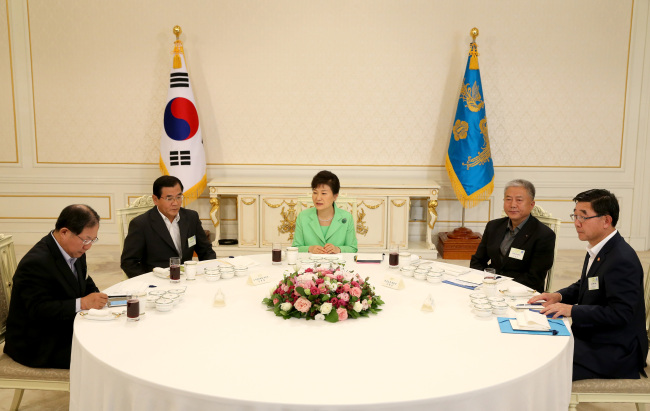President Park Geun-hye said Tuesday that the government is open for further discussions with unions and employers on a set of labor reform measures, in a move to soothe workers and opposition parties as the ruling party gears up to press ahead with the swift legislation of the bills.
In a luncheon with representatives of a trilateral panel of the government, labor union and the business representatives, the president thanked them for reaching a landmark deal on labor reform last week, vowing that the government would reflect “the spirit of the grand compromise” demonstrated during the marathon talks.
Calling it a difficult task, however, the president raised concerns over the prospect of the labor reform as it faces a bumpy road ahead with the opposition parties remaining reluctant on legislative negotiations with the governing Saenuri Party and a trade union threatening to stage a nationwide walkout.
 |
| President Park Geun-hye and representatives of the tripartite panel on labor reform attend a luncheon at Cheong Wa Dae. Ahn Hoon/The Korea Herald |
“We have reached the beginning of the labor reform after much difficulties, but I believe that the reform process planned ahead will also be very difficult, but important, too,” said Park.
“Every reform is a hard task to achieve, but it will be completed only when we all share the pain and the burden we may face in the course of the (reform) process.”
Responding to Park’s remarks, Kim Dae-hwan, the chairman of the trilateral committee, said the panel will start a follow-up discussion in early October and launch a separate team to check whether the agreements are fully reflected in the legislation process.
The chairman also said he would report the process to the president, citing her “profound interests” in the labor reform.
President Park has set labor market reform as the top priority on her policy agenda in the second half of the year, viewing increased market flexibility as key to generating jobs for the young and reviving the slowing economy.
In a separate meeting last week, the government, the ruling party and the presidential office agreed to unilaterally devise details of measures including the ways of easing restriction on layoffs ― the matter of which was left open for further discussion between labor and business.
Kim had been expressing concerns over the ruling party and the government speeding up the legislation process without workers’ approval when the tripartite committee’s negotiations were being bogged down.
After an intense scuffle, the Federation of Korean Trade Unions’ executives approved the deal on Sept. 14, despite persistent opposition from some of its members. The Korea Confederation of Trade Unions, the second-largest and more radical trade union in the country that had been left out of the negotiation, meanwhile, vowed all-out protests against the compromise.
The South Korean business circle, for their part, said it doesn’t hold a negative view of the recent agreement on labor reform.
“The tripartite agreement is meaningful because government, business and labor leaders reached a broad consensus. It is a great leap forward,” said Park Yong-man, chairman of the Korea Chamber of Commerce and Industry.
Major businesses had been saying the deal fell far short of expectations and called on lawmakers to adopt more sweeping labor reforms.
In the landmark deal, the panel agreed on highly contentious issues, including easing restriction on layoffs and extending the maximum employment period for temporary workers.
Opposition parties and the KCTU blasted the panel’s agreement, calling it an outcome of collusion among the tripartite members. They have been claiming that the measures were biased in favor of businesses for easier employment conditions.
By Cho Chung-un (christory@heraldcorp.com)



